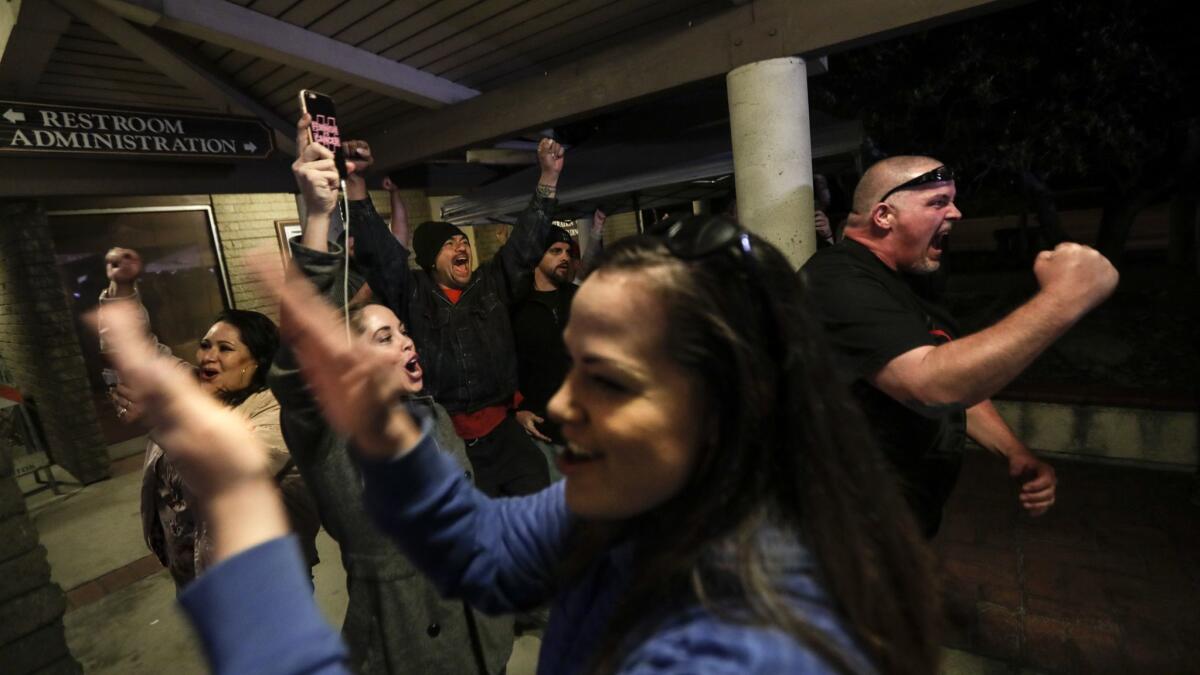Column: Orange County’s anti-sanctuary fervor is all but guaranteed to backfire

- Share via
When Americans think of Orange County, they’re envisioning Los Alamitos. It’s the county’s second-smallest city — a place of big houses, a military base and a population that’s 71% white. The local claims to fame are an ever-excellent high school football team and the Pasty Kitchen, a shop specializing in Cornish meat pies.
Los Alamitos made national news last week after its City Council announced it wants to opt out of SB 54, the California Values Act. This so-called sanctuary state law, enacted at the start of this year, seeks to keep local law enforcement from doing the work of la migra.
Councilmembers, however, say they need to fight the statehouse on this issue to protect residents from illegal-immigrant criminals. But it’s all a show. Crime is continuously low here. Really, the city is still trying to save face after a major scandal earlier this decade: The Zetas cartel openly set up shop in town to launder drug money through quarter-horse racing at a nearby track. It was an international embarrassment that made a mockery of Los Alamitos’ law-and-order sense of self.
The bill’s primary purpose is to protect Californians, plain and simple.
What the City Council did, though, is nothing new: Shasta, Tehama and Siskiyou counties declared themselves no-sanctuary zones in February. Yet little Los Al has sparked rumblings of an anti-sanctuary revolution in Orange County. Huntington Beach announced it wants to explore a similar move. Monday, the O.C. Sheriff’s Department began posting online the release dates of all inmates, a workaround for tipping off Immigration and Customs Enforcement. Tuesday, the County Board of Supervisors voted 3-0 to join U.S. Atty. Gen. Jeff Sessions’ lawsuit against the Values Act.
I actually understand the ire of these conservative municipalities. Undocumented folks are only 6% of California’s population, yet the state Legislature seems to focus more on their needs than other groups’ needs nowadays. And, at first read, a law that ostensibly shields criminals from deportation sounds like an insult to every peaceful resident. But the Assembly members and state senators who voted for the California Values Act were remarkably clear-eyed. Opposition to it is myopic.
First off, the bill’s primary purpose is to protect Californians, plain and simple. I know it’s hard for cities and counties trying to un-sanctuary themselves to grasp this. So take it from Californians who live among the undocumented or are related to them: They are us. They came here because they want the California Dream as much as citizens do — and they work for it thrice as hard. SB 54 gives them a degree of comfort that any small encounter with police won’t rip them away from their loved ones.
And given that the Trump administration wants to make life for the undocumented as miserable as possible--witness the 2020 Census plan to ask respondents about citizenship status--we should help them as much as possible.
Also, the sanctuary bill, whether local politicians like it or not, is state law and there’s a mature way to challenge laws. I disagree with him, but Sessions at least acts like an adult by challenging it in federal court. Municipalities that declare they are opting out, on the other hand, are just playing pretend-Oath Keepers. Take Councilman Warren Kusumoto, who proposed Los Alamitos’ anti-sanctuary ordinance because, he says, the Values Act violates the U.S. Constitution. Yet he doesn’t seem to care about any legal consequences that may befall the city. “Is it going to hold up?” he told a reporter for this paper about the council’s resolution. “I don’t know.”
Meanwhile, Mayor Troy Edgar just set up a GoFundMe page to pay the city’s potential legal costs. And conservatives nationwide cheer childishness like this? No wonder they’re going to get destroyed in the 2018 midterms.
Sanctuary opponents won’t buy my above arguments, so let’s talk their talk: crime. This is where California’s liberal Legislature has acknowledged a fact that conservatives haven’t: By deporting people convicted of breaking the law, we create more crime and more immigration.
The most famous local example, of course, is MS-13, a Los Angeles gang whose members we deported to Central America in the 1990s. What happened? The group metastasized and unleashed violence that pushed their countrymen northward. The same is now happening in Mexico, where deportees are either targeted as victims of crime or recruited into gangs and cartels because few other job prospects exist.
The California Values Act isn’t meant to protect the “bad guys.” Felons get no free pass. Instead, it shields people like my dad. He got a DUI in the 1980s, when he was undocumented, because he was a raging borracho. Kusumoto and others would’ve had him gone; he would’ve probably died of alcoholism down in Mexico. Instead, a judge sent him to Alcoholics Anonymous. This year marks 35 years of sobriety for Papi, and he’s helped Latino immigrants leave the booze and become better individuals for decades.
So as tinhorn politicians bloviate against our sanctuary state, know that they do so with no method to their madness. The one bright side is that politicians like Kusumoto are guaranteeing their eventual demise. Anti-immigrant measures may still play in the tiniest parts of Orange County or the reddest parts of the state, but they will eventually founder in the new California. And if you don’t believe me, how’s the state GOP doing statewide since Proposition 187?
mexicanwithglasses@gmail.com
@gustavoArellano
UPDATES:
2:07 p.m.: This column was updated with the results of a vote by the Orange County Board of Supervisors and to add the Orange County Sheriff’s Department’s policy of posting the release date of inmates.
More to Read
A cure for the common opinion
Get thought-provoking perspectives with our weekly newsletter.
You may occasionally receive promotional content from the Los Angeles Times.










